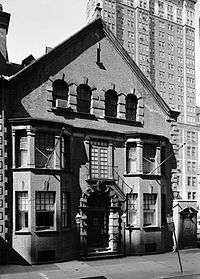Poor Richard Club

The Poor Richard Club was a private club in Philadelphia, Pennsylvania, whose members were mostly members of the advertising industry. The club was founded in 1906 with 75 members, just a year after a similar club opened in New York. The advertising industry was on a quest for more respectability, and the clubs were created as a way to promote and enforce ethical guidelines. Nevertheless, they functioned largely as places to nurture business, social, and political relationships.[1]
The following year, the club purchased a large Victorian house at 239-241 Camac Street in which to hold their weekly lunches and monthly dinners. By 1911, membership had grown to 350.[1]
In 1916, the club published "Poor Richard's Dictionary of Philadelphia," an informative, sometimes humorous, guide to all aspects of the city, including historical landmarks, businesses, churches, hotels, hospitals, and clubs. The book was presented to Associated Advertising Clubs of the World members who attended the annual meeting held at the Poor Richard Club House.[2]
In 1925, the club moved to the Dr. Joseph Leidy House, 1319 Locust Street, which they shared with the Charles Morris Price School of Advertising and Journalism, founded by members of the club in 1920.
The club was instrumental in proposing, funding, and raising the Benjamin Franklin National Memorial, built in 1933.[3]
The club's major event was its annual banquet, at which the members presented an annual award for public service.[1] Among the recipients of the club's Gold Medal of Achievement were:
|
|
On January 17, 1956, the club held their 50th anniversary dinner at the Bellevue-Stratford Hotel and honored then Vice President Richard Nixon with the Gold Medal of Achievement.[6]
The club had over 600 members in the 1930s, but membership declined in the 1970s. The Locust Street building was sold in 1979, and the club disbanded a few years later.[7]
References
- 1 2 3 4 5 6 7 Williams, Jerome D.; Wei-Na Lee; Curtis P. Haugtvedt. [https://books.google.com/books?id=9hAlgMS08moC&dq="poor+richard+club"+philadelphia&num=100&source=gbs_navlinks_s Diversity in Advertising: Broadening the Scope of Research Directions]. Lawrence Erlbaum. p. 472.
- ↑ Officers of the Poor Richard Club
- ↑ Huang, Nian-Sheng (1994). [https://books.google.com/books?id=s9rMn0Gu-J0C&pg=PA180&dq="poor+richard+club"+philadelphia&num=100&ei=2WmgSpm_DZeMyQSGnJTmDg#v=onepage&q=%22poor%20richard%20club%22%20philadelphia&f=false Benjamin Franklin in American thought and culture, 1790-1990]. Memoirs of the American Philosophical Society. p. 180. ISBN 978-0-87169-211-5.
- ↑ Chandler, Alfred Dupont; Louis Galambos. [https://books.google.com/books?id=wOxmAAAAMAAJ&q="poor+richard+club"+philadelphia&dq="poor+richard+club"+philadelphia&num=100&ei=2WmgSpm_DZeMyQSGnJTmDg The papers of Dwight David Eisenhower, Volume 9].
- ↑ "I Gotta Tell You" - Speeches of Lee Iacocca - Matthew W. Seeger Wayne State University Press, 1994
- ↑ 50th Poor Richard Anniversary Dinner program.
- ↑ Matt Golas, Matt Golas. "Updated: Strange streets of blue glazed brick and wooden block". PlanPhilly.com. Retrieved June 2010. Check date values in:
|access-date=(help)
Further reading
- Lutz, Jack (1953). The Poor Richard Club: its birth, growth and activities, and its influence on advertising, the city, state and nation. 237 pp. Published by the Poor Richard Club.